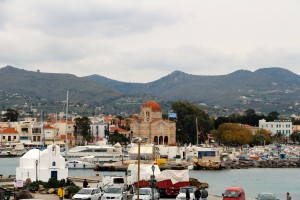
I can’t believe that we have already had 2 weeks of classes! This was the 5th week that I have been in Greece and I am so happy to say that I am really getting to know this country in terms of its past and present. Quick update on which classes I am taking this semester: Modern Greek 1, Attic Tragedy (a literature class focused on ancient Greek theater), Greek Religion and Mythology, Ancient Aegean Archeology, and a service learning class (where we talk about the current issues in Greece and get a volunteering internship for the semester). Overall, this is a COMPLETELY different type of course load than the kinesiology, psych, and pre-health classes that I am used to, but this has been a great change of pace. I am learning that a semester abroad is the perfect time to take classes that are WAY far out of your major and comfort zone.
For my service learning class, I started interning this last week with an organization called Doctors of the World, which is somewhat similar to Doctors Without Borders in that it cares for vulnerable or underserved populations globally. So far I have been doing a lot of observation of the doctors and nurses, taking blood-glucose levels for diabetics, and helping nurses change wound dressings. I am so thankful to have this experience seeing a different side of Greece than what any guidebook or tour guide will tell you. For those of you who are squeamish about blood and open wounds, I will spare the details, but I will say that some of the doctors and patients have really opened my eyes to how bad the economic hardships have actually been, especially for the poor immigrant population who are already discriminated against.
In the in-class part of the service-learning course, we have been talking a lot about the concept of “volunteering” and why its not really something most people do in Greece (from outside appearances anyway). From what I have been told, it all boils down to different definitions of “civil responsibility” in Greece compared to what we are used to in the US. While it is completely normal for people in America to be connected with numerous committees and volunteering organizations, Greeks see civil responsibility in a closer sense of the word. Here, the focus is on focus serving on the people you are immediately connected with, rather than an organization’s target population whom you don’t know. For example, if a family member falls into hard economic times, it is the responsibility of the family to take that person in, no questions asked. To fail to do so would be a serious social taboo. This is why there are so few homeless people in Greece despite high unemployment. In another context, Greek storeowners will often give you a free pastry and glass of water, while in America, professional interactions are more formal and detached. The Greeks seek to build a relationship with you as a customer, if not as a friend. To put the contrast simply, in America, we tend to be a bit more removed from the people we serve, but we are more intentional. In Greece, service is intuitive and close to home. This is not to say that one form of serving is better than the other, merely that they are different. I will continue to give updates about how the internship is going throughout the semester.